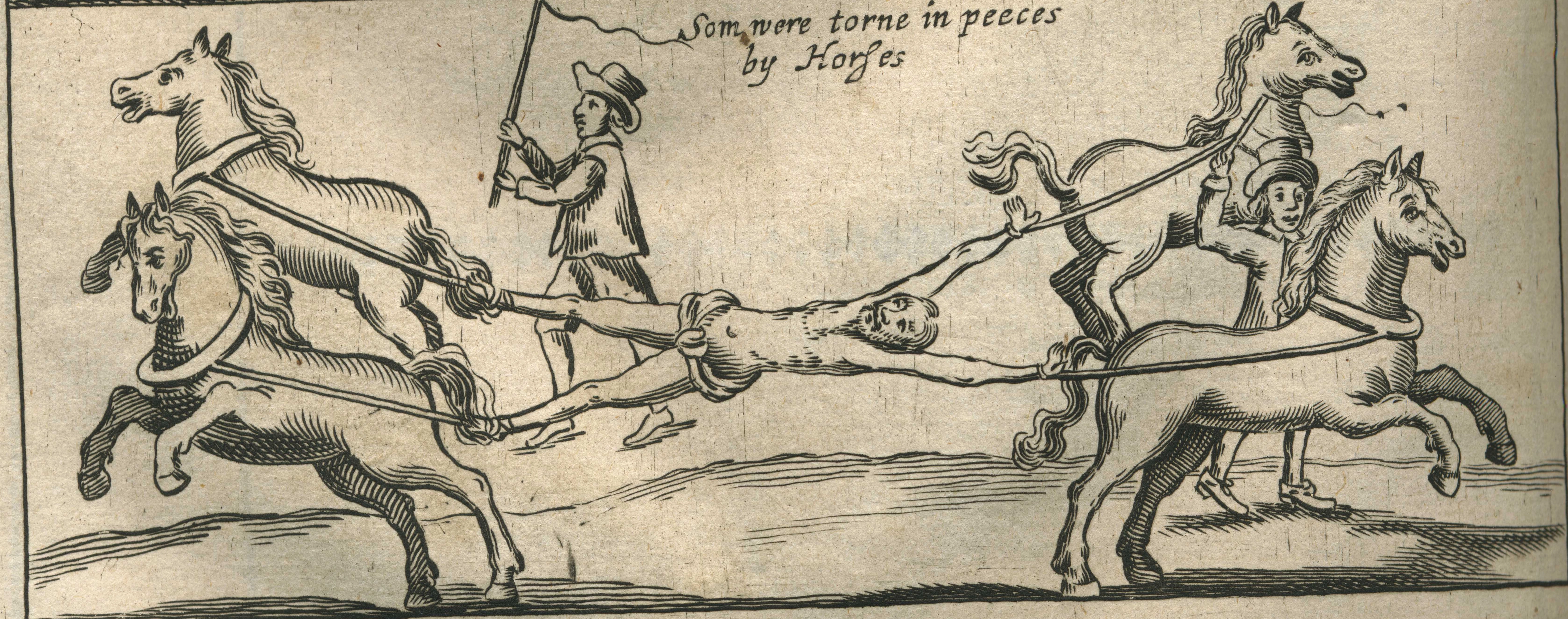Montaigne, describing a public execution he witnessed while in Rome, expresses his horror at the cruelty of those who
invent vnused tortures and vnheard-off torments; to devise new and vnknowne deathes, and that in colde blood, without any former enmitie or quarrel, or without any gaine or profit; and onely to this end, that they may enjoy the pleasing spectacle of the languishing gestures, pittifull motions, horrormoving yellings, deep-fetcht groanes, and lamentable voyces of a dying and drooping man… (Michel de Montaigne, Essays, translated by John Florio, London, 1613, p. 237)
That expression, ‘pleasant [or pleasing] spectacle’, first occurs in print in English in Chaloner’s translation of Desiderius Erasmus, The Praise of Folie (London, 1549, sig. F2v), where it does not directly correspond to the Latin, which merely says, ‘‘multo etiã suauius, si quis animaduertat anus’ (‘it is much more pleasant if one sees an old woman’, Erasmus, Moriæ Encomium Erasmi Roterdami Declamatio, Strasbourg, 1511, sig. C6v., my translation). Erasmus is not discoursing on torture and mutilation, but there is an element of cruelty in what he says, since he is commenting on the follies of old men and women attempting to perpetuate their youth.
The expression also occurs – twice – in Brende’s translation of Quintus Curtius Rufus, The History of Quintus Curcius (London, 1553) fols 83r and 164r), both times in the context of perverse cruelty, once in direct translation of ‘lætum spectaculum’, and once embellishing on the Latin. Florio’s usage above, too, corresponds to ‘plaisant spectacle’ in the original.
While the expression does occasionally crop up in English texts which are not translations, the ironic use of ‘pleasant spectacle’ to describe scenes which are anything but pleasant occurs mainly in works translated from either Latin or French, or, less frequently, from Italian and Spanish.
Of course, the expression was also used in contexts which were not ironic – and not just to describe idyllic scenes such as Venice in the early morning; in these sanguinary times, bear-baiting, or the execution of a villain, might be described, quite without irony, as a pleasant spectacle. But the ironic use of the expression is closely connected with Latin and the Latin languages, and seems to reflect an acceptance of the entertainment value of others’ woe. In the words of a French Jesuit,
Teares have (I know) not sweetnesse, which makes us to love them; and though they may be the marks of grief in those that shed them, they are motives of joy to those that consider them. The sole sight of one in misery gives the experience of this truth … all sorts of Wretches draw us to the compassion of their sufferings, and … we resent a kind of pleasure to sigh with them… (René de Cerisiers, The Triumphant Lady: or, The Crowned Innocence, trans. by William Lower, London, 1656, pp. 1–2)
The Latin South of Europe provides many examples of unabashed revelling in the suffering of others, and, while it is not entirely absent from Protestant discourse, it is far scarcer. One wonders, though, whether the real difference between those who take the pleasure of seeing others suffer for granted and those who, with self-betraying irony, attribute such sentiments to others is that the former are simply more honest…
(Adapted from Part 2, ‘The Suffering of Others’, Chapter 5, ‘The Spectacle of Suffering’.)



Comments